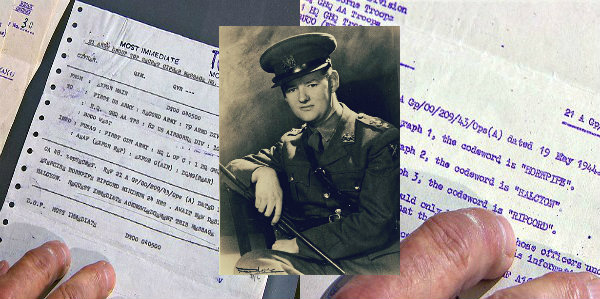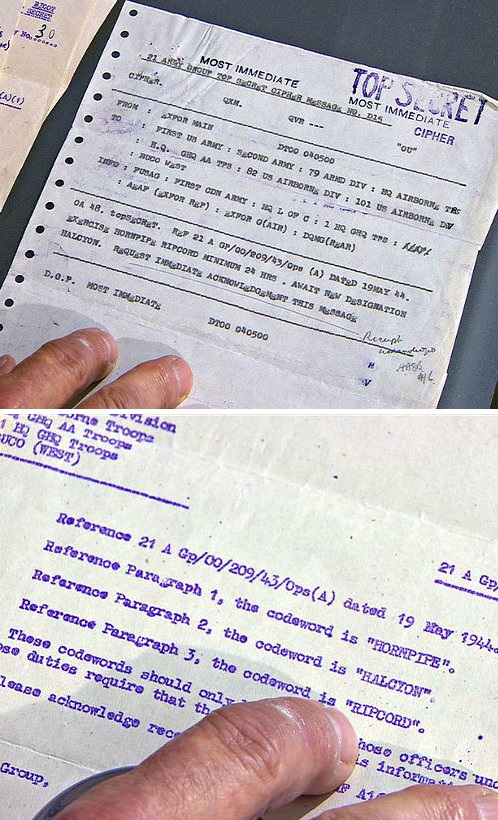
The set of never-before-seen WWII documents disclose that the code names to be used on the D-Day be changed amidst fears that the Germans have the knowledge of the said operation.
Ever since its conception in 1943 the Allies’ higher authorities referred to the planned mass invasion of the then Nazi-occupied France as Operation Overlord.
However, the top secret WWII documents let out by the son of a late Army officer who was involved in D-Day’s planning clearly state that commanders decided to change the code names to be used during the operation at the 11th hour.
As the WWII documents indicate, an urgent memo was delivered to the Allied Forces’ senior officers eighteen days before the planned June 6 raid – May 19, 1944. In these said papers, the code name “Overlord” had to be changed to Hornpipe while “D-Day” be swapped to Halcyon.
Furthermore, the memo also said that to delay the operation by 24 hours, the code name “Ripcord” should be used.
This last-minute changes were made after concerns about how the original code names were leaked and worked out were raised. It can be remembered that many of the code names used during the D-Day, including Overlord, came out in a national newspaper’s crosswords section.
The Discovery
Richard Wheeler was the one who stumbled upon the WWII documents when he was cleaning out his later father’s house, Major San Wheeler.
Accordingly, Major Wheeler had helped planned out D-Day’s logistics, a brainchild of Field Marshal Bernard Montgomery, and somehow, he ended up keeping the papers which bore the mark “top secret”.
When BBC’s Antiques Roadshow came to Durham Cathedral, Richard Wheeler the WWII documents and showed them to the show’s experts who were left amazed when he explained to them what they were.
As what the , 67-year-old said in the interview, his father, Sam Wheeler, joined the army at the outbreak of WWII and worked his way up the army’s ranks. He eventually joined the 21st Army Group when 1944 came.
The said unit was based at the army headquarters in London and held responsibility for planning out D-Day. Richard further added that since his father was involved with the operation’s logistics, he would naturally have been close to the messages contained in the WWII documents as they were passed back and forth.
He said that he discovered the papers while he was cleaning out his parents’ house way back 1999 following his mother’s death. When he showed the WWII documents to his friends, however, no one gave so much thought about them.
It was when Richard heard that the Antiques Roadshow was coming to Durham that people started to get excited about the papers when he expressed his desire to take them in and show them to the experts in the program.
Richard found it amazing that records as “history changing” as these had been in his hands for many years and to think that his father also had them before him.
One of the Antiques Roadshow experts, Paul Atterbury, admitted that the WWII documents Richard brought with him are intriguing as D-Day is a well documented event of the war.His curiosity is focused on the information the papers reveal — that there was a different set of code names used in days close to D-Day albeit even for just a short time.
He they in the show agree that the Allies feared the security of Operation Overlord had been compromised since many of the code names associated with it appeared in crosswords arousing suspicions.
As the WWII documents were issued on May 19, 1944, Atterbury believed they went into use immediately.Nonetheless, when the higher authorities of the Allied Forces saw the success of D-Day, the use of the new code names were also promptly abandoned.
Atterbury also said that the documents may be in existence in the national archives but nobody ever thought of examining them closely. The WWII documents Richard brought it had a ring of authenticity and came from a source with clear links to Montgomery’s office.
The expert pointed out that not one of the many books about D-Day ever mention this change in code names and as far as the show’s specialists know, the story is something unheard of before. It means that the WWII documents in Richard’s possession could be “history changing”.
